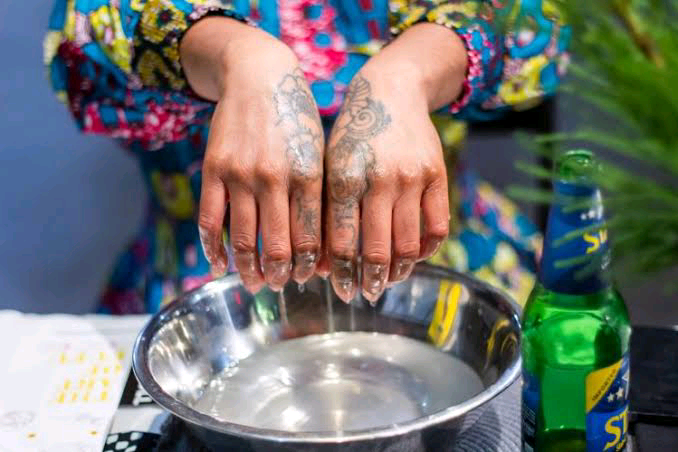Every human tribe or ethnic group across the globe has its unique customs – including those associated with food and dining. In spite of the numerous distinct tribes in the nation, Nigerians are generally known for their warm hospitality. Nevertheless, it is wise for a foreigner, visitor or non-indigene to learn the general Nigerian food etiquette observed in many households.
You will not only create a good first impression by doing so. Learning Nigerian food etiquette will further guarantee that you will enjoy warm reception anytime you visit such homes again. In fact, they will willingly invite you over. Note also that observing food customs in Nigeria is a tool for cementing family bonds and even business partnerships.
Key Customs that Constitute the Nigerian Food Etiquette
Before visiting any locality in Nigeria, it will do you a ton of good to research the local customs and available facilities there. You can employ both online sources, and the help of travel guides. We urge you to take note of both general Nigeria customs, and customs specific to each region or tribe.
Here are a few typical food customs that comprise the Nigerian food etiquette you should not ignore.
On Entering a Nigerian Home
You are generally expected to remove your shoes before entering a typical Nigerian home. However, it is not always required. When it is deemed necessary, your host will inform you.
Again, allow your host to welcome or lead you into the house – do not rush ahead of them. When required to move from one room or area to another, allow the senior members of the hosting party to lead the way.
When Hosting Muslims
Muslims are particular about avoiding certain foods or drinks. These customs are strongly taken to heart especially in northern Nigeria, where they are in very large numbers. As such, you should take note of them.
When Hosting Muslims, do not serve them pork or alcohol in any form.
When Muslims Host You
While Muslims dine together (especially in northern Nigeria), it is quite common to see men, women and children dine in separate groups. Men dine with fellow men, women with fellow women, and children with their peers.
Additionally, the men are offered the best food first; then the women, and lastly children.
Dining in Groups
An important Nigerian food etiquette is eating together with family and friends. Communal eating serves an opportunity to build closer bonds between people.
In traditional society, people may even eat together from the same bowl(s)/plate(s). Platters may be passed around or placed on the table – for people to take their share of snacks, fruits or food as well.
Order of Service
In virtually every Nigerian tribe, a demonstration of deep respect for elders is the norm. The same custom is displayed while serving or sharing food. Elders (or the oldest person) are normally allowed to eat first. By extension, you are expected to wait for the elders to serve themselves (and start eating) before you begin to eat.
However, an invited guest is often served first (not a strict rule though). Afterwards the oldest male, then the other men, then women, and lastly children would be served.
Eating with the Hands
All over Nigeria, the practice of eating local dishes with the right hand is prevalent. But you must wash your hands with water (and optionally, soap) both before and after every meal. Again, the left hand is not preferred because it is considered unclean and impolite to use it, compared to the right hand.
If you are provided with cutlery (especially spoon or fork), you are also expected to use your right hand. However, the educated elite are now more tolerant towards left-handed diners.
Drinks Served with Meals
In the southern parts of Nigeria, drinks such as palm wine, beer (and other forms of alcohol) are commonly served with traditional meals. Modern adjustments have made people opt for wines and fruit juices as well.
In northern Nigeria, tea is commonly served with meals. It is often served in three rounds. The first round is unsweetened; the second round will contain just a bit of sugar. The final round has the most sugar. This practice is a demonstration of developing friendship.
However, there are some common locally-made drinks that are well-known accompaniments with food across the country. Notable amongst them are the three West African drinks namely Zobo (sorrel/hibiscus juice), Soya milk, and Tigernut milk.
In any case, it is considered unruly to eat and drink at once. Eat a morsel, then take a drink. Yet again, wait to be served a drink – do not be too forward to pour your own drink.
Rule Against Smoking
Nigerian food etiquette does not accept smoking during or around meals. You may have to wait till the meal is over (and do so outside the dining area).
Chew Slowly, Savor the Meal
You are not expected to rush through a Nigerian meal. Take your time to enjoy the taste. You may engage in hearty conversations while doing so. Promise yourself to enjoy the moment.
At the End of The Meal: Show Appreciation
It is a show of respect and appreciation to thank your hosts for feeding you well, after the meal. Offer compliments to the cook, and comment on how you enjoyed your meal.
Eating with Strangers (at a Restaurant Table)
When dining in a bukateria or informal restaurant, you may have to share a table with strangers. Nevertheless, learn to respect the other person’s privacy and comport yourself. Do not force any conversation.
You can call for the waiter or waitress with eye contact, or subtle signaling with the hand. It is often seen as rude to call out their names. If you must call the service staff, do so in a polite way.








